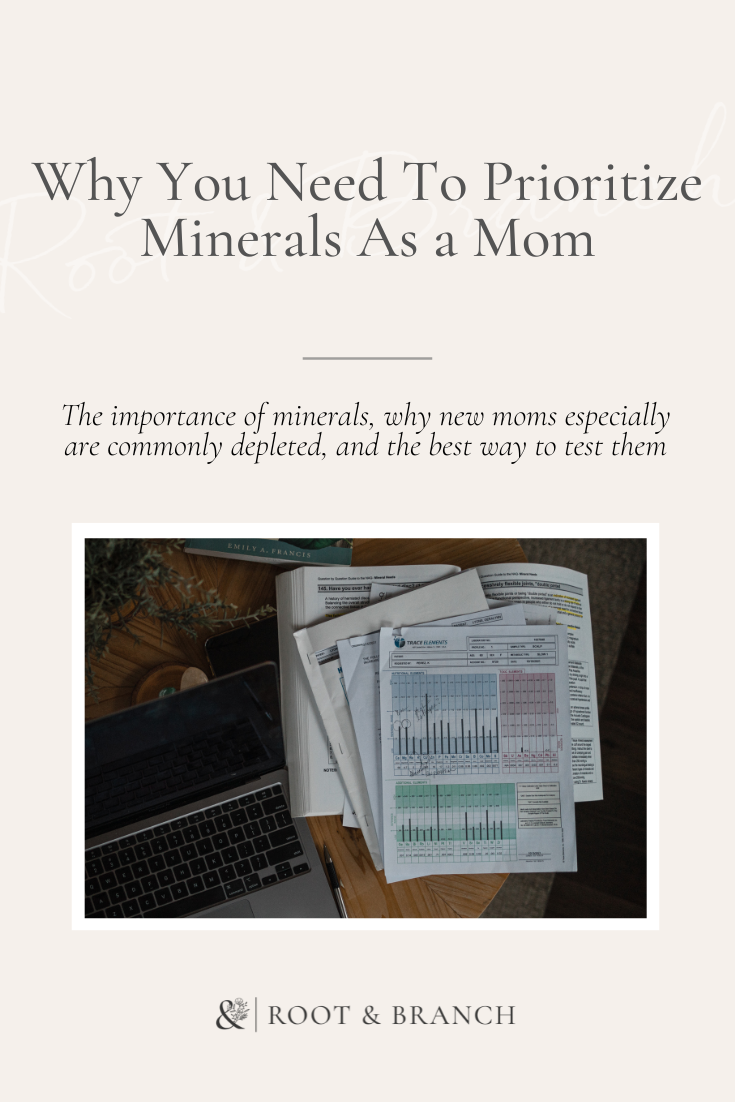Why You Need To Prioritize Minerals As a Mom
Growing and nourishing a baby is an energy- and nutrient-demanding process.
It’s estimated that each pregnancy gives around 10% of a mom’s mineral stores to her baby—and breastfeeding can continue to pull minerals from a mama’s body.
(Research even shows that bone mass decreases while lactating partly due to the impact on minerals.)
And especially if a mom’s diet is nutritionally-insufficient, she’s not sleeping and therefore, restoring fully, or she’s under a lot of stress (who isn’t as a new parent!?), it’s far-too-easy to become deficient and imbalanced.
But why the big focus on minerals, especially for moms?
Well besides the fact that pregnancy and postpartum increase mineral demand, minerals are critical for life and abundant health. They act like spark plugs in the body by activating enzymes that carry out chemical reactions for the metabolism.
This means that mineral sufficiency and balance in the body is crucial for energy production, thyroid and adrenal function, hormone balance, nervous system health and stress handling, and more.
Common signs you need mineral support:
Exhaustion that doesn’t improve with sleep
Anxiety or other mental health struggles (while causes are multifaceted, micronutrient deficiencies are a huge risk factor)
Decreased ability to handle stress
Irritability and tendency to get overstimulated
Muscle tightness or cramping
Dizziness especially with postural changes
Increase in cavities or other dental issues
High or low blood pressure
Sluggish digestion (i.e. bloating, constipation, reflux)
Continued hair loss (beyond what’s normal postpartum)
Painful periods and/or irregular cycles
Increased cavities
Not assessing minerals is an enormous missed opportunity to support postpartum moms in particular. Women are simply more at risk for mineral imbalance.
Unfortunately, minerals are not commonly tested, and so deficiencies are frequently overlooked.
If anything, a routine blood panel may check electrolytes like sodium and potassium. But it’s important to understand that blood levels of minerals are tightly monitored by the body in order to maintain a specific amount and not go too high or too low, which can be dangerous. So bloodwork doesn't necessarily provide a reflection of the overall mineral status of the body.
In comparison, the hair provides a very accurate reflection of the entire body’s mineral stores. In fact, hair tissue mineral analysis (HTMA) is a great way to assess the mineral activity inside of the cells because as hair forms, it’s exposed to the body’s internal environment. Once it reaches the surface of the skin, it essentially “locks in” what’s been accumulated as it formed.
Which means the hair contains a metabolic blueprint—a record of the body’s mineral status—that has occurred over the last 3-4 months.
Because the HTMA properly assesses these mineral levels, it can detect imbalances, deficiencies, and excesses as well as show key ratios that tell us so much about the body. From just 1 small sample of hair, we can assess things like your nervous system state and stage of stress, adrenal function, blood sugar regulation, digestive health, and more!
This is a huge reason why the HTMA is such an amazing test (on top of its affordability and accessibility)—especially for moms.
Want to see an example of this test in action?
In the snippet from a postpartum mama’s HTMA report below, you can see how most of her minerals are below the reference range. This pattern—especially when the first four minerals are low—is a surefire sign of depletion.
And when I reviewed her mineral ratios, I was able to determine that not only did she need overall replenishment, but also:
Her adrenals needed lots of support.
We like to see the “adrenal ratio” of Na/Mg between 2 and 6 and hers was .43. And her “vitality ratio” (Na/K)—another sign of adrenal health—was 1 whereas we like to see it between 1.4-3.4.
Her blood sugar needed attention.
A high Ca/Mg ratio—hers was 13.91 compared to optimal range of 3.3-8.5—is a sign of low blood sugar, which is stressful for the body and taxes the adrenals more.
Her body wasn’t able to properly utilize thyroid hormones.
Her high thyroid ratio—32 compared to optimal of 2.2-6.2—reflects what we call “cellular hypothyroidism.” High calcium to potassium slows the thyroid and reduces cellular sensitivity to thyroid hormones.
Based on all of her findings, we were able to create a plan to help sufficiently nourish her body and address her needs and imbalances through her diet, targeted supplements, and even lifestyle shifts to help her get the restoration and stress relief she needed!
Having this information meant essentially taking a “shortcut” on her healing journey—by understanding the exact root causes of her symptoms, we could simplify the process for her and personalize it according to her needs.
Want to know what’s really going on with your minerals—and get to the root of those lingering symptoms?
Let’s take the guesswork out of it.
Book a Deep Dig session with me and we’ll do just that.
With this one-time 1:1 functional nutrition consultation, you’ll take your own mineral test (HTMA) along with other functional assessments. Together, we’ll dive into your health history, uncover hidden imbalances, and connect the dots between how you're feeling and what your body’s asking for.
You’ll walk away with a personalized, doable roadmap to support your body, boost your energy, and finally start feeling like you again—without burning out or obsessing over every little thing.





